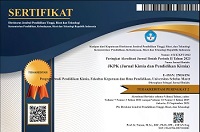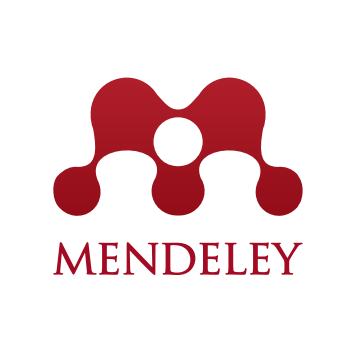Module Development with Problem Based Learning (PBL) Model Based on Environmental Wetland to Increase Students’ Learning Outcomes
Abstract
Research has been carried out on the development of modules with the Problem Based Learning (PBL) model based on wetland environments on the topic of acid-base solutions. This study aims to determine: the validity, practicality and effectiveness of module development. This study used a research & development design of a 4-D development model that was modified into 3-D, the data collection techniques used a test of student learning outcomes and a questionnaire. The research was conducted at SMAN 3 Banjarmasin with a sample of 10 students of class of XI PMIA 3 for small-scale trials, 24 students of XI PMIA 3 for limited-scale trials, and class of XI PMIA 1 and XI PMIA 2 with total 74 students for testing in a wide scale. Validity can be seen based on the results of the validation, the practicality of the students’ responses, and the effectiveness of the students' learning outcomes. The results showed that the module was considered valid with an average score of 146.4 and a percentage of 91.58% (very valid), practical with a percentage of 82.90% (good), effective with an average N-gain score of 0.84 (high), the average score of N-gain is 0.87 (high) for class of XI PMIA 1 and 0.86 (high) for class of XI PMIA 2. The results of this study indicate that the module with the Problem Based Learning (PBL) model based on the wetland environment on the topic of acid-base solutions is declared valid, practical and effective for use as a learning resource for students.
Keywords
Full Text:
PDFReferences
Kemendikbud. Peraturan Menteri Pendidikan dan Kebudayaan Republik Indonesia Nomor 65 Tahun 2013 tentang Standar Proses Pendidikan Dasar dan Menengah. Jakarta: Kemendikbud. 2013
H.N. Khotim, S. Nurhayati, & S. Hadisaputro, Development of Based Chemical Modules Problem-on Acid-Base Materials. Chemistry in Education, vol. 4, no. 2. 2015
M. Situmorang & A.S.Situmorang."Efektivitas Modul Pembelajaran Inovatif untuk Meningkatkan Hasil Belajar pada Pengajaran Laju Reaksi". Jurnal Penelitian Bidang Pendidikan. Vol. 20, No. 2, pp. 139-147, 2014.
D. C. Kusuma, Analisis komponen-komponen pengembangan Kurikulum 2013 pada bahan uji publik Kurikulum 2013. Jurnal Analisis Komponen Pengembangan Kurikulum, Vol.5, pp. 1-21,2013.
W. Kurniawan, F. B. Pujaningsih, A. Alrizal,, & N. A. Latifah, "Analisis Kebutuhan Mahasiswa terhadap Bahan Ajar sebagai Acuan untuk Pengembangan Modul Fisika Gelombang Bola dan Tabung". Edufisika: Jurnal Pendidikan Fisika, vol. 3, no.1, pp. 17–25,2018
DOI: 10.22437/edufisika.v3i01.5805
N.Izzati, S. Hindartto & D. Pamelasari, " Pengembanagan modul tematik dan inovatif berkarakter pada tema pencemaran lingkungan untuk siswa kelas VII SMP". JPII, vol.2, no.2, pp.183- 188,2013.
R. Widyaningrum, S. Sarwanto & P. Karyanto, Pengembangan Modul Berorientasi Poe (Predict, Observe, Explain) Berwawasan Lingkungan Padamateri Pencemaran Untuk Meningkatkan Hasil Belajar Siswa". Bioedukasi, vol. 6, no.1. 2013.
DOI: 10.20961/bioedukasi-uns.v6i1.3920
R. Imanda, I. Khaldun & A. Azhar, (). Pengembangan Modul Pembelajaran Kimia SMA Kelas XI Pada Materi Konsep Dan Reaksi-Reaksi Dalam Larutan Asam Basa. Jurnal Pendidikan Sains Indonesia (Indonesian Journal of Science Education), vol. 5, no.2, pp. 41-48.2017
A. Pummawan, " The development of an elearning module on the sandy shores ecosystem for grade-8 secondary students". Educational Journal of Thailand, vol. 1. no.1, pp.95- 110. 2007
DOI: 10.20961/bioedukasi-uns.v6i1.3920
E. Rachmati, Aunurrahman, & A. Usman, "Pengembangan Modul Pembelajaran Kimia Untuk Kecakapan Membangun Dan Menggunakan Konsep Redoks Dan Hidrokarbon Kelas X SMAN 3 Sungai Kakap". Jurnal Pembelajaran Prospektif, vol.1, no. 2. 2016.
Y. P.Sukiminiandari, , A. S. Budi & Y.Supriyati, "Pengembangan modul pembelajaran fisika denganpendekatan saintifik". In Prosiding seminar nasional fisika. Vol. 4, pp. SNF2015-II). 2015
R.D.M.Sari & L. Rachmawati, "Pengembangan Modul Pembelajaran Berbasis Problem Based Learning Pada KD Mendeskripsikan Bank Sentral, Sistem Pembayaran dan Alat Pembayaran dalam Perekonomian Indonesia Kelas X IIS SMAN 1 Krembung". Jurnal Pendidikan Ekonomi (JUPE), vol.5, no.3.2017
C. Tosun & E. Senocak, "The effects of problem-based learning on metacognitive awareness and attitudes toward chemistry of prospective teachers with different academic backgrounds". Australian Journal of Teacher Education, vol. 38, no.3, pp. 126- 131,2013
C. Tosun & Y. Taskesenligil, "The effect of problem-based learning on student motivation towards chemistry classes and on learning strategies". Journal of Turkish Science Education, vol. 9, no.1, pp. 104-125,2012
M. B. Etherington, " Investigative primary science: A problem-based learning approach". Australian Journal of Teacher Education (Online), vol,36,no.9, pp.53-74, 2011.
DOI: 10.14221/ajte.2011v36n9.2
E. De Graaff, & A. Kolmos, "Characteristics of problem-based learning". International Journal of Engineering Education, vol. 19, no.5, pp. 657-662, 2003.
B. W. Febriana, A. Ashadi, & M. Masykuri, " December). Pengembangan modul kimia berbasis problem-based learning (PBL) pada materi senyawa hidrokarbon dan turunannya kelas XI SMK Kesehatan Ngaw"i. Prosiding SNPS (Seminar Nasional Pendidikan Sains). Vol. 1,pp. 1-10. 2014
Mundilarto & H.Ismoyo, " Effect of problem-based learning on improvement physics achievement and critical thinking of senior high school student". Journal of Baltic Science Education, vol. 16, no.5, 761-780, 2017
V. Batdi, " The effects of problem based learning approach on students’ attitude levels: A meta-analysis". Educational Research and Reviews, vol. 9, no. 9, pp. 272-276, 2014.
DOI: 10.12973/eurasia.2016.1293a
H. Zakiyah & N. Ulfa, "Pengaruh Model Pembelajaran PBL (Problem Based Learning) Terhadap Hasil Belajar Siswa Pada Materi Bahan Kimia Dalam Kehidupan Sehari-Hari". Lantanida Journal, vol. 5, no.2, pp.106-118,2018.
.
Y. N. Nafiah, & W. Suyanto, "Penerapan model problem-based learning untuk meningkatkan keterampilan berpikir kritis dan hasil belajar siswa". Jurnal Pendidikan Vokasi, vol. 4,no.1. 2014
M. A. Soendjoto, "Sekilas tentang lahan basah dan lingkungannya". Prosiding Seminar Universitas Lambung Mangkurat pp. 1-20.2016
.
I.Ibrahim, N. Aminudin, M. A.Young, & S. A. I. Yahya, "Education for wetlands: public perception in Malaysia". Procedia-Social and Behavioral Sciences, vol. 42, pp. 159-165. 2012 DOI: 10.1016/j.sbspro.2012.04.177
S. Thiagarajan, D. S. Semmel, , & M. I. Semmel, " Instructional development for training teachers of exceptional children: A sourcebook. Leadership Training Institute/Special Education", University of Minnesota.1974
H. Ulya, R, B. Rudibyani, T. Efkar, " Pengembangan Modul Kimia Berbasis Problem Solving Pada Materi Asam Basa Arrhenius". Jurnal Pendidikan dan Pembelajaran Kimia. vol. 8, no.1. 2018.
A. Alfiantara, E. Kusumo, & E. Susilaningsih, " Pengembangan Modul Berorientasi Problem Based Learning Berbantuan Aplikasi Android". Jurnal Inovasi Pendidikan Kimia, vol. 10, no. 2, 2016
Pujayanto, Supurwoko, Y. Radiyono, D. W. Adi, "Development of problem-based learning material for physics mathematics and its implementation"International Journal of Science and Applied Science: Conference Series, vol. no. 1, 2017.
DOI:10.20961/ijsascs.v1i1.5104
A. Puspadewi, & Syahmani. "Improve Learning Outcomes of Students With Model Learning Problem Based Learning (PBL) Assisted Module Within Content Solution". Buffer Journal of Science Education Innovation, vol. 7, no.1, pp. 19-26,2016
Y. Winarti, DR Indriyanti, & E.S. Rahayu, "Development of Ecology Teaching Material for 2013 Curriculum with SETS through the Application of Problem Based Model Learning". Educational Science Gazette, 14-23.2015
U. Mahmudah, & A. Sholahuddin, "Utilization of Environmental-Based Learning Resources in Learning Electrolyte and Non-Electrolyte Solutions Using Inquiry Models Guided to Improve Motivation, Understanding Concepts, and Skills of Science Process Students". Journal of Science Education Innovation, vol. 7, no.1. pp. 46-54,2016.
J. Harta, R. V. Listyarini, F. D. N. Pamenang, L. W. Wijayanti, & W. Lee, "Developing Small Scale Chemistry Practicum Module to Investigate Students’ Ability in Predict-Observe-Explain (POE) Implementation". JKPK (Jurnal Kimia dan Pendidikan Kimia), 5(1), 91-99.
S. Retnowati, "The STEM Approach: The Development of Rectangular Module to Improve Critical Thinking Skill. International" Online Journal of Education and Teaching, vol. 7, no. 1,pp 2-15. 2020, Google Scholar
A.S. Ardan, " The Development of Biology Teaching Material Based on the Local Wisdom of Timorese to Improve Students' Knowledge and Attitude of Environment in Caring the Perseverance of the Environment". International Journal of Higher Education, vol. 5 , no.3, pp. 191-200, 2016.
R. Iriani, A. Herlina, Y. Irhasyuarna, & R. E. Sanjaya, "Modul pembelajaran problem-based learning berbasis lahan basah untuk mempersiapkan calon pendidik berwawasan lingkungan lahan basah". Jurnal Inovasi Pendidikan IPA, 5(1), 54-68,2019.
I. Ramawati, E Maryani & A. Mulyani, "Utilization of the Surrounding Environment as Resources Learning for Learning to Improve Critical Thinking Abilities". Journal of Geography Education. vol. 16, no. (1),pp. 66-87.2019.
Refbacks
- There are currently no refbacks.








